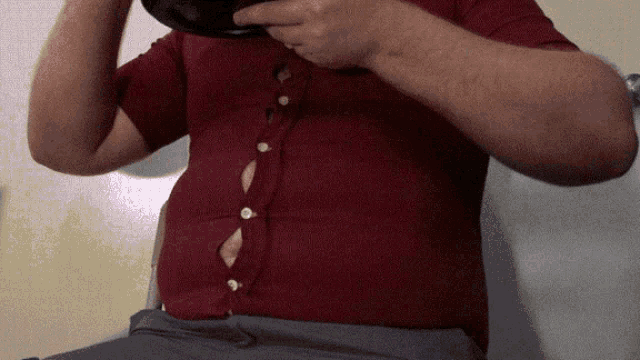We’ve all been there! You munch on something delicious and the next thing you know you feel like you’ve swallowed a football.
Ugh! Now you need to undo the jeans button.
And when this happens around friends and colleagues, the embarrassment can be anxiety provoking. So much that you might just choose to have nothing but water.
If you’ve ever wondered, “Why do I feel like a pufferfish after eating?” then read on.
What Exactly is Bloating?
The simple answer is, bloating is a sensation of increased abdominal pressure.
Imagine you’re a balloon, and someone’s sneakily trying to fill you up with air (or gas). It feels tight, right?
Here’s the inside scoop (or should we say “scoop of air”?): when you munch on those delicious bites, your stomach and small intestine break down the easy stuff.
But some hard-to-digest fellows sneak into the large intestine. The bacteria there, always up for a challenge, roll up their sleeves and declare, “It’s chow time!”
As they feast away, they produce a cocktail of gases like carbon dioxide, hydrogen, and even a touch of methane.
Think of these bacteria as tiny chefs who, after whipping up their signature dishes, release these gases as their “chef’s kiss” to the meal.
So, the next time you feel that belly puffing up, remember, it’s just the afterparty of a microscopic feast down there. So, that’s bloating for you!
Should You Be Worried About It?
If you’re worried about bloating as a sign for medical complications then remember, everyone bloats from time to time (yes, even those Instagram influencers).

Emily Skye / Instagram Influencer (@emilyskyefit) Source: Prevention.com
Most times, bloating could be just that: a gas build-up. But persistent bloating can sometimes hint at underlying issues like IBS, food intolerances, or even, very rarely, ovarian cancer.
It’s like your tummy’s way of saying, “Hey! Something’s up!”
If you’re experiencing bloating too often, it might be worth saying hello to your medical practitioner.
Why do We Feel Bloated?
Okay, so we’ve established bloating can be annoying as a mosquito in your bedroom. But why does it even happen?
Food & Drink
Some foods are like that one friend who always overstays their welcome at a party – they just don’t leave your gut easily! Certain foods are harder for our digestive system to process, leading them to linger longer and become the main course for bacteria in our large intestine.
As these bacteria munch away, they release gases, turning our bellies into unintended air balloons.
Notorious culprits on the bloating lineup include:
- beans
- lentils
- broccoli
- cabbage
- onions
- dairy products (for those who might be lactose intolerant)
- some artificial sweeteners, especially sugar alcohols
Similarly, excessive consumption of carbonated drinks like sparkling wine, soft drinks and beers can introduce a burst of carbon dioxide into our system, leading to that inflated, ‘I-feel-like-a-balloon’ sensation.
Swallowed Air
While food is often the prime suspect in our bloating mystery, there’s another sneaky accomplice – swallowed air.
Every time you chug a drink, chew gum, or maybe talk a little too enthusiastically about the latest episode of your favourite show, you swallow air. And guess what?
That air’s got to go somewhere. And sometimes, instead of an easy exit, it decides to loiter in the gut. The nerve!
Food Fermentation
Tiny friends in our gut, a.k.a gut bacteria, feast on the food we eat, sometimes releasing gas in the process. When undigested bits of food reach the large intestine, bacteria have a field day. Think of them as tiny, enthusiastic chefs whipping up their special dish – gas. This is called fermentation.
The bacteria break down the food, releasing several gases like carbon dioxide, hydrogen, and sometimes even methane. It’s their version of saying, “Hey, we had a great meal!” But for us? Well, hello, bloating!
Stress
Ah, stress! That pesky intruder that doesn’t just mess with our moods but has the audacity to crash our digestive party, too.
When we’re stressed, our body goes into its ancestral “fight or flight” mode. While this was super handy for our cave-dwelling ancestors dodging saber-toothed tigers, for us modern folks, it just means our digestive system gets put on the backburner.
Digestion slows down, leading to a potential traffic jam in our gut. Plus, stress can alter the balance of our gut bacteria – the friendly little microbes who usually help keep things moving smoothly. When they’re out of whack, it’s like a poorly-managed dinner party in there, with some guests (gas-producing bacteria) overstaying their welcome.
The result? A bloated belly.
Visit from Aunty Flo
Ah Aunt Flo! Nature’s monthly reminder that comes with mood swings, cravings, and, for many, the joy of the “premenstrual puff-up”.
When Aunt Flo is preparing to roll into town, hormone levels, specifically progesterone, rise. This sneaky hormone tends to slow things down in the digestive department, leading to a bit of a traffic jam, if you will.
Meanwhile, our bodies are also retaining more water and salt, a perfect recipe for that “I-feel-like-a-water-balloon” sensation.
Quick Fixes for Bloating
Here are some quick-relief remedies:
- Herbal Teas: A warm cup of peppermint or chamomile tea can ease the tension.
- Exercise: Gentle walks can help move things along (if you catch my drift).
- Over-the-Counter Remedies: Products like antacids or gas-relief medicines can be helpful.
How You Can Prevent Bloating
When you’re aiming to keep your stomach from mimicking a hot air balloon, some preventive steps can go a long way! Here’s a fun and slightly sassy guide on how to keep that belly calm, cool, and decidedly un-inflated.
Eat Slowly: Savor Your Food, Don’t Gobble it Down!
Picture this: you’re at a gourmet restaurant, and instead of relishing each bite, you’re inhaling your food as if it’s a pie-eating contest.
Not the best move for your tummy! When you eat too quickly, you’re not just swallowing food, but also a good deal of air.
The more air you swallow, the more likely it is to get trapped in your digestive tract, resulting in that undesirable balloon belly.
Plus, slow eating is genuinely good manners, darling!
Limit Gas-Producers: Maybe Skip Beans on a Date Night?
There’s a rogue’s gallery of foods notorious for being the chief bloating culprits. Beans, lentils, broccoli, and cabbage might be nutritious, but they can also turn your digestive system into a veritable gas factory.
Now, we’re not saying ban them from your diet (that would be a nutritional tragedy), but maybe reconsider that bean salad or broccoli stir-fry before a romantic date or a day at the beach in your swimsuit.
Or just prep yourself for the potential bloat aftermath. Maybe carry a fan? For dramatic effect, of course!
Stay Hydrated: Water is Like Your Gut’s Personal Assistant
Imagine water as the efficient PA who’s always ready to help out, ensuring things run smoothly in the gut department.
Staying well-hydrated can assist in moving food through your digestive system and prevent constipation, a notorious bloating buddy.
Plus, drinking water can balance out any extra salt you’ve consumed, which might be causing water retention (another sneaky bloating factor).
So, sip, sip, hooray! Keep that water bottle handy, and your gut will reward you with smoother operations.
Double-Down on Probiotic Foods
Now, for the uninitiated, probiotics are live beneficial bacteria that can be consumed through supplements or foods like yogurt and fermented foods. Think of them as a friendly boost to your gut’s community, kinda like sending in reinforcements for the home team.
While bloating can sometimes be due to a jamboree of unhelpful bacteria throwing a wild party in your tummy, introducing probiotics can help balance this out, ensuring the good guys reign supreme.
Several studies have shown that certain strains of probiotics can alleviate the symptoms of irritable bowel syndrome, of which bloating is a notorious member.
When to Seek Expert Advice
While occasional bloating is as common as a cheesy rom-com on a Saturday night, sometimes it’s not just about that extra serving of beans.
If your belly’s acting like it’s housing a whole brass band (with trumpets blazing all day and night) or you’ve been feeling bloated for more than a few weeks, it might be time to call in the pros.
When bloating comes with other funky jazz like weight loss, severe abdominal pain, or any changes in the colour or frequency of your poop, it’s a sign to grab the phone.
Bloating could sometimes be a flag waved by more serious underlying issues, such as IBS, IBD, or even ovarian cancer.
Remember, always better to be safe than sorry – if your gut’s giving you the blues, you better call Saul (if your GP’s name is Saul that is)!
Conclusion
Today, we embarked on a whimsical journey into the bubbly world of bloating. From the microscopic fiesta in our guts, the sneaky drinks playing the gas game, to the hormonal dance during periods, and the subtle cues of when it’s time to ring up a doc – we’ve covered it all. Prevention is indeed better than cure, so remember to munch mindfully, sip sensibly, and always keep an ear (or belly-button!) out for what your tummy is telling you. Because, at the end of the day, every gut has a story, and it’s up to us to ensure it’s a breezy one. Until next time, stay deflated and elated!
Note to reader: Always consult a healthcare professional for persistent or concerning symptoms. This article is intended for general information, not medical advice!
References:
- Mayo Clinic. “Bloating, belching and intestinal gas: How to avoid them.” Mayo Clinic, 2019. [Online]. Available: https://www.mayoclinic.org/
- NHS. “Bloating.” NHS, 2020. [Online]. Available: https://www.nhs.uk/
- S. Smith, “The gut’s microbiome changes rapidly with diet.” Nature News, 2013. [Online]. Available: https://www.nature.com/










